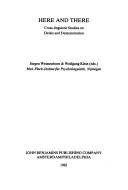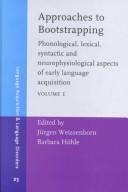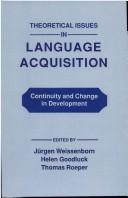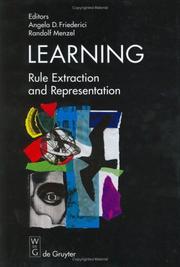| Listing 1 - 10 of 13 | << page >> |
Sort by
|

ISBN: 9027225192 9786613359605 128335960X 9027280622 9789027225191 9789027280626 9781283359603 6613359602 Year: 1982 Volume: 3/2-3 Publisher: Amsterdam Philadelphia J. Benjamins
Abstract | Keywords | Export | Availability | Bookmark
 Loading...
Loading...Choose an application
- Reference Manager
- EndNote
- RefWorks (Direct export to RefWorks)
Deixis - the rooting of utterances in the speech situation - is one of the most salient universals of natural language. The ways in which different languages link utterances to pragmatic factors such as speech time, speech place, and speech participants show a rich variation. This makes deixis a particular fruitful domain for the study of universals, language comparison, and the relationship between language and reality. This volume presents and discusses deictic systems of both Indo-European and non-Indo-European languages, including Russian, Czech, Spanish, German (standard and dialect), Hun
Grammar, Comparative and general --- Deixis --- Deixis. --- Lexicology. Semantics --- Pragmatics --- -801.56 --- 801.56 Syntaxis. Semantiek --- Syntaxis. Semantiek --- Comparative grammar --- Grammar --- Grammar, Philosophical --- Grammar, Universal --- Language and languages --- Philosophical grammar --- Linguistics --- Philology --- Grammar, Comparative --- 801.56 --- Deixis (Linguistics) --- Indexicals (Semantics) --- Deictic function --- Grammar, Comparative and general - Deixis

ISBN: 9027224919 9027224927 1556199937 9786612162527 1282162527 902729822X 1556199929 9786612162534 1282162535 9027298238 9789027298232 9781282162532 9781556199929 9789027298225 9781282162525 Year: 2001 Publisher: Amsterdam Philadelphia John Benjamins Pub. Co.
Abstract | Keywords | Export | Availability | Bookmark
 Loading...
Loading...Choose an application
- Reference Manager
- EndNote
- RefWorks (Direct export to RefWorks)
What features of brain processing and neural development support linguistic development in young children? To what extent is the profile and timing of linguistic development in young children determined by a pre-ordained genetic programme? Does the environment play a crucial role in determining the patterns of change observed in children growing up? Recent experimental, neuro-imaging and computational studies of developmental change in children promise to contribute to a deeper understanding of how the brain gets wired up for language. The multi-disciplinary perspectives of cognitive neuroscience, experimental psycholinguistics and neural network modelling are brought to bear on four distinct areas in the study of language acquisition: early speech perception, word recognition, word learning and the acquisition of grammatical inflections. Each area demonstrates how linguistic development can be driven by the interaction of general learning mechanisms, highly sensitive to particular statistical regularities in the input, with a richly structured environment. This interaction provides the necessary ingredients for the emergence of linguistic representations that support mature language processing. Similar epigenetic principles, guiding the emergence of linguistic structure, apply to all these domains, offering insights into the precocity of young infant's sensitivity to speech contrasts as well as to the complexities of the problem facing the young child learning the Arabic plural.
Psycholinguistics --- Language acquisition. --- Language awareness in children. --- Children --- Language acquisition --- Interpersonal communication in children --- Language

ISBN: 0805803807 Year: 1992 Publisher: Hillsdale, N.J. Erlbaum
Abstract | Keywords | Export | Availability | Bookmark
 Loading...
Loading...Choose an application
- Reference Manager
- EndNote
- RefWorks (Direct export to RefWorks)
Developmental psychology --- Cognitive psychology --- Psycholinguistics
Digital
ISBN: 9783111598468 9783484500792 Year: 2017 Publisher: Berlin ;; Boston De Gruyter Mouton, ; Max Niemeyer Verlag
Abstract | Keywords | Export | Availability | Bookmark
 Loading...
Loading...Choose an application
- Reference Manager
- EndNote
- RefWorks (Direct export to RefWorks)
Digital

ISBN: 9783111357126 9783484301108 Year: 2014 Publisher: Tübingen Max Niemeyer Verlag
Abstract | Keywords | Export | Availability | Bookmark
 Loading...
Loading...Choose an application
- Reference Manager
- EndNote
- RefWorks (Direct export to RefWorks)
Book

ISBN: 9783110803488 Year: 2011 Publisher: Berlin Boston
Abstract | Keywords | Export | Availability | Bookmark
 Loading...
Loading...Choose an application
- Reference Manager
- EndNote
- RefWorks (Direct export to RefWorks)


ISBN: 9783110803488 9783110161335 Year: 2011 Publisher: Berlin ;; Boston De Gruyter
Abstract | Keywords | Export | Availability | Bookmark
 Loading...
Loading...Choose an application
- Reference Manager
- EndNote
- RefWorks (Direct export to RefWorks)
Digital

ISBN: 9783110864212 9783110106817 Year: 2011 Publisher: Berlin ;; Boston De Gruyter Mouton
Abstract | Keywords | Export | Availability | Bookmark
 Loading...
Loading...Choose an application
- Reference Manager
- EndNote
- RefWorks (Direct export to RefWorks)
Digital

ISBN: 9783110933932 9783484730533 Year: 2012 Publisher: Tübingen Max Niemeyer Verlag
Abstract | Keywords | Export | Availability | Bookmark
 Loading...
Loading...Choose an application
- Reference Manager
- EndNote
- RefWorks (Direct export to RefWorks)
Book

ISBN: 9783110194258 Year: 2008 Publisher: Berlin Boston
Abstract | Keywords | Export | Availability | Bookmark
 Loading...
Loading...Choose an application
- Reference Manager
- EndNote
- RefWorks (Direct export to RefWorks)
| Listing 1 - 10 of 13 | << page >> |
Sort by
|

 Search
Search Feedback
Feedback About UniCat
About UniCat  Help
Help News
News